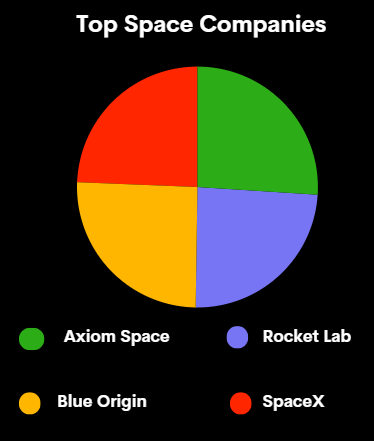Space and Defense
.png?width=500&height=500&name=Untitled%20design%20(26).png)

Our story
We invest in aerospace and defense because it supports U.S. national security and advances space exploration. These major defense contractors are essential to the defense and security infrastructure of the United States. Moreover, these companies play a pivotal role in innovating new technologies that enable us to continue advancing as a civilization and explore new worlds. This encompasses military aircraft, radar equipment, weapons, satellite-based consumer products and services, rocket and satellite manufacturing, deployment and maintenance, space technology hardware, ground equipment manufacturing, and space-based imagery and intelligence services.

This surge in satellite launches is driven by increasing demand for global communications, Earth observation, and scientific research. The trend reflects the growing importance of space technology
Defense Budget
U.S. defense budget 2022
Totaled approximately $777 billion, marking a strong emphasis on modernization and readiness. Key allocations were made to nuclear deterrence, space capabilities, and next-generation technologies to counter emerging threats from global competitors.
U.S. defense budget 2023
Rose to about $816.7 billion, reflecting a focus on strategic competition with China and Russia. The funding prioritized hypersonic weapons development, cybersecurity enhancements, and expanded investments in the U.S. industrial base and supply chain resilience.
U.S. defense budget 2024
Climbed to a proposed $842 billion, making it the largest ever. This budget supports advanced weapons systems, AI integration, and space operations while continuing to invest heavily in personnel, infrastructure, and alliances to ensure long-term U.S. military dominance.
Extracting Minerals
Companies pursuing asteroid mining is a strategic bet on the future of humanity’s technological and economic growth. These space ventures aim to unlock vast reserves of rare and valuable minerals like platinum, gold, and water that are critical for clean energy, electronics, medical technology, and space infrastructure. Basically innovation.
.png)
GOLD
Mining gold from space could eventually supplement Earth’s limited reserves without the environmental damage caused by traditional mining. While not immediately practical to bring back in large quantities, space-sourced gold could one day support advanced electronics, high-precision instruments, and serve as a financial asset in the space economy.
.png)
WATER
Water can be split into hydrogen and oxygen to create rocket fuel, enabling in-space refueling stations and reducing the need to launch heavy payloads from Earth. It also provides drinking water and breathable air for astronauts, making long-term missions to the Moon and Mars more viable.
.png)
PLATINUM
Vital for clean energy technologies like hydrogen fuel cells and catalytic converters. Asteroids contain significantly higher concentrations of platinum than Earth, and space-based extraction could stabilize or even reduce its cost over time. This would support greener technologies
What's going on around the world
.png?width=500&name=Logos%20(49).png)
Ongoing Conflict
As of mid‑2025, there are over 110 active armed conflicts and civil wars worldwide, impacting more than 40 countries including Sudan, the Democratic Republic of Congo, Ukraine, Yemen, Gaza, and Myanmar with millions facing violence, instability, and humanitarian crisis
Cyber Threats
Global cost of cybercrime is expected to reach $10.5 trillion annually by 2025, up from $3 trillion in 2015.